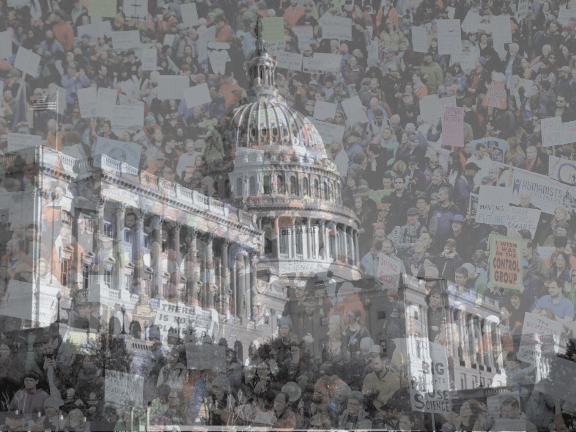As the actions of the Trump administration incite nationwide protests, the U.S. government faces a new wave of political activism from groups that had previously been largely neutral—including scientists. Most recently, scientists have been dismayed at the administration’s proposed budget cuts funding from key institutions that support scientific research, including a $5.8 billion cut (18%) to the National Institutes of Health.
The attitude of the administration towards science has galvanized scientists to call for more outreach and public engagement. Scientists are entering a new era of political activism.
After the election, a group of faculty and staff came together and called a town hall to discuss ways to promote an accurate representation of science in politics. These conversations led to the creation of a campus group called Concerned Scientists at IU. Dr. Londergan is a founding member.
These local movements have sparked a national March for Science that occurred this past Earth Day.
Dr. Tim Londergan, a founding member of CS @ IU, attended the national March for Science in Washington, D.C. Although it was chilly outside the Washington Monument, he was struck by how many people attended the march.
“The early anti-war marches were very much like this,” Dr. Londergan recounted. “They were very positive.”
Catherine Xu, IU sophomore, attended the march in Indianapolis. She was encouraged by the fact that the march brought people together and “shifted from a political thing into a community.”
Although the overall atmosphere at the March for Science in Indianapolis and in Washington seems to be positive, there is still much work to be done.
“After all,” Dr. Londergan admits, “a march doesn’t really do anything except that it demonstrates that a number of people feel strongly about this and it gives you a sense of solidarity. But other than that, unless it is the springboard for something further, it doesn’t accomplish anything.”
He hopes to continue gathering local support for scientific integrity through Concerned Scientists at IU. In his keynote address at the IUJUR Student Author Banquet, Dr. Londergan outlined the two main goals of CS @ IU. The first is lobbying government officials to use more scientific research in creating legislation. The second is engaging the public with science.
Beyond lobbying officials, IU sophomore Reyan Coskun would also like to see scientists take one step further in engaging with politics.
“I think it would be beneficial if scientists could actually go into government and make change within political institutions,” Coskun suggested. “If scientists want to make substantial change, they have to embed themselves within the system and change it from within.”
Many dispute the notion that science and politics should mix.
“I did not want science to become politicized,” Dr. Londergan said. “Unfortunately, I think this has already happened, so one has a choice to either ignore the fact that science has become politicized or to participate in the process.”
The politicization of science happened a long time ago.
Galileo Galilei was forced by the Catholic Church to recant his defense of a heliocentric solar system. Charles Darwin’s theory of evolution has been rejected by creationists and distorted by eugenicists. Rachel Carson’s Silent Spring led to the ban of DDT in the United States and the creation of the Environmental Protection Agency.
Throughout history, science has been used for both the advancement and the suppression of knowledge. Perhaps it is too late to ask if science and politics should mix. However, science activists must be careful that their message is not distorted.
The March for Science claims to be nonpartisan, but that may be far from the truth. IU freshman Damon Pham, who attended the Indianapolis march, noted that the march did not seem to distinguish between science advocacy and liberal ideology.
The March for Science and CS @ IU aim to defend science against misuse, but they can easily become a mouthpiece for Democratic criticism of the Republican administration.
Xu was also worried. “It was fun to see all the political stuff happening at the March for Science,” she said, “but I definitely was a little bit concerned that it would increase the polarization and partisan divide of science.”
Although Xu had reservations about attending the march, she ultimately felt that “it was important to empower this group that hasn't been mobilized as a bloc yet to show that a lot of people do care about this.”
She notes that a balance must be struck between politics and science.
Through continued conversation, science activists can bridge divides on polemic issues. But the movement is at a crossroads—it has both the power to increase political polarization and the power to eradicate it. Although national movements increase the movement’s visibility, the decision will ultimately come down to the actions of local groups like CS @ IU. Dr. Londergan hopes to avoid partisanship by encouraging the public to think for themselves.
“People who are trained don’t have to rely on scientists to tell them the answers,” Dr. Londergan said. “They can go out and do it themselves.”


